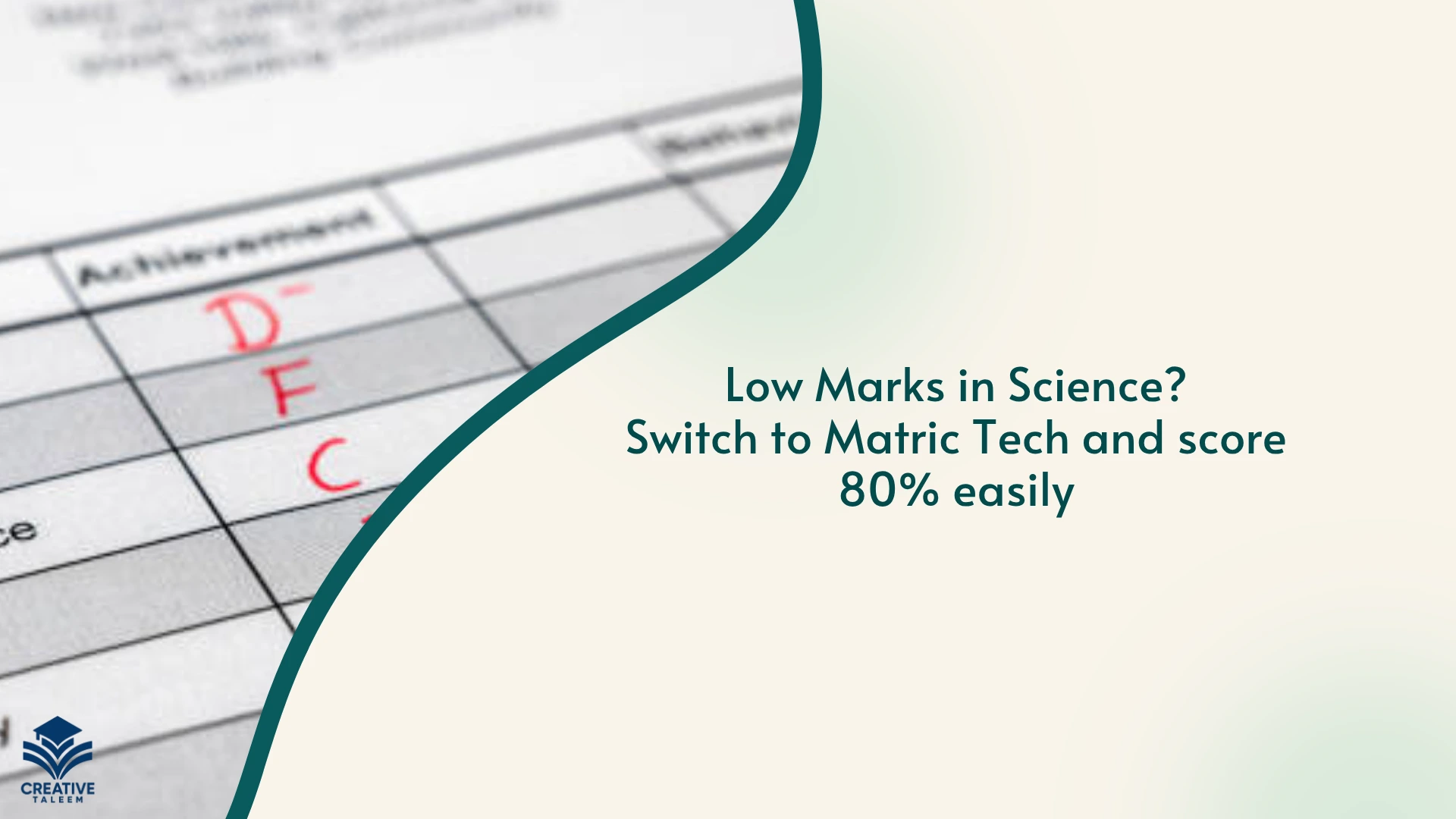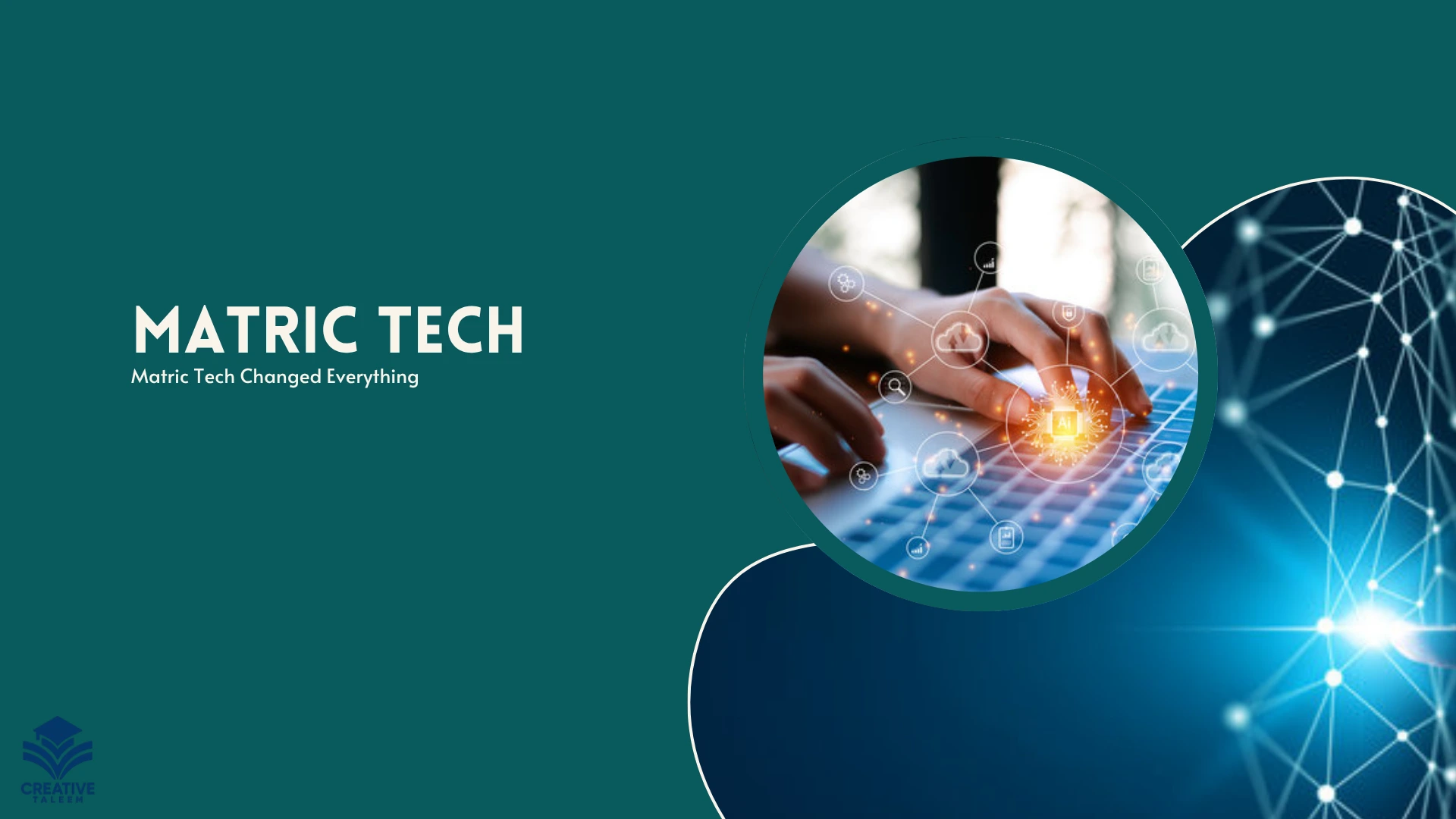Best Alternatives to FSc Pre-Medical for Intermediate Students
After studying Biology in Matric, most students think FSc Pre-Medical is their only option. But what if MDCAT becomes a roadblock? Discover 6 medical technology fields that offer guaranteed career paths without the competitive exam pressure.

You studied Biology in Matric because you wanted a medical career. Now in intermediate, everyone pushes you toward FSc Pre-Medical. The tough syllabus, weak foundation from previous years, and the terrifying MDCAT exam that only 20-30% of students pass each year. What happens to the rest? Some feel completely defeated. Others spend lakhs on private medical colleges. Many change fields entirely or even quit education. But here's something most people don't tell you: in 2026, a new category called Intermediate Medical Technology has opened doors to medical careers without the MDCAT nightmare.
Why FSc Pre-Medical Isn't Your Only Path Anymore
For years, students who took Biology in Matric felt trapped in one path. FSc Pre-Medical seemed like the only route to a medical career. The pressure was unbearable. Parents expected MBBS or BDS. Teachers constantly reminded you about MDCAT. Friends competed ruthlessly for top positions. And even after all that hard work, the reality hits hard when MDCAT results come out.
The numbers don't lie. Pakistan has thousands of medical aspirants but limited seats in government medical colleges. Private medical colleges exist, but their fees are beyond what most families can afford. What about the majority of students who don't make it? They're left confused, disappointed, and unsure about their future. Many waste another year preparing again, hoping for better luck next time.
But 2026 brought a game-changing opportunity. The new Intermediate Medical Technology group offers specialized fields that were previously only available after FSc. Now you can study these fields right from intermediate level. These aren't backup options or second-class careers. These are legitimate, in-demand medical professions with excellent job prospects and decent salaries. Let me show you exactly what options you have.
Six Medical Technology Fields You Can Choose Instead of FSc Pre-Medical
1. Medical Laboratory Technology: Testing Behind Every Diagnosis
Think about the last time you or someone in your family needed a blood test, urine test, or any medical diagnostic test. Who performed those tests? Medical Laboratory Technologists. This field is in massive demand because every single patient who walks into a hospital needs some form of laboratory testing. Doctors rely heavily on these test results to make diagnoses and treatment decisions.
You're already familiar with this field even if you don't realize it. Every time you've seen someone getting their blood drawn at a lab, every time a family member needed their sugar levels checked, every time someone got tested for infections or diseases, that was Medical Laboratory Technology in action. The best part? This field has consistent demand in both government and private hospitals, diagnostic centers, and research laboratories. You'll never struggle to find work.
2. Medical Imaging Technology: The Eyes Inside the Body
Pakistan has one of the highest rates of road accidents in the world. When someone gets injured and bones might be damaged, what's the first thing doctors do? They order X-rays, CT scans, or MRIs. That's Medical Imaging Technology. You've probably seen those dark films with white bone images, or maybe you've had an ultrasound done. All of these imaging techniques require trained professionals to operate the equipment and capture the images doctors need.
This field includes X-rays for broken bones, ultrasounds for pregnant women and digestive issues, CT scans for detailed internal views, MRI for soft tissue imaging, and PET scans for detecting serious conditions. Every hospital needs multiple imaging technologists because these machines run constantly throughout the day. The technology keeps advancing, which means the field continues to grow and offer better opportunities for those who stay updated with new equipment.
3. Operation Theatre Technology: The Doctor's Right Hand
Have you ever watched a medical drama where surgeons perform operations with a whole team around them? That team isn't just nurses and doctors. Operation Theatre Technologists, often called OT technicians, are crucial members of that surgical team. They prepare the operation theatre, sterilize equipment, hand instruments to surgeons during procedures, and ensure everything runs smoothly during surgery.
If you've had a family member or friend who went through surgery, you might have seen these professionals in action without knowing what they were called. Both government and private hospitals desperately need OT technicians because surgeries happen every single day. From emergency operations after accidents to planned surgeries for various conditions, these technicians make it all possible. It's a respected position with job security and the satisfaction of directly helping save lives.
4. Ophthalmic Technology: Bringing Vision Back to Life
Look around your family, your school, your neighborhood. How many people wear glasses? How many have visited an eye specialist? Pakistan has millions of people with vision problems, from simple nearsightedness to complex eye diseases. Ophthalmic Technologists work alongside eye doctors to test vision, measure eye pressure, help fit contact lenses and glasses, and assist in eye treatments and minor procedures.
Remember when you got your eyes tested and someone put different lenses in front of you asking which is clearer? That person was likely an Ophthalmic Technologist. They operate specialized equipment, conduct preliminary eye exams, and handle everything from routine vision checks to helping patients recover from eye injuries or surgeries. After gaining experience, many Ophthalmic Technologists open their own optical centers or work independently, making this a field with excellent long-term career potential.
5. Physiotherapy Technology: Restoring Movement and Independence
You've probably seen someone who couldn't walk properly after an accident or stroke. Maybe an elderly relative who struggled with joint pain. Perhaps an athlete recovering from a sports injury. All of these people need physiotherapy. Physiotherapy Technologists use specialized equipment and exercises to help patients regain strength, improve mobility, reduce pain, and return to their normal lives after injuries or illnesses.
This field is booming in Pakistan as awareness grows about rehabilitation and physical therapy. Hospitals have dedicated physiotherapy departments. Sports clubs hire physiotherapists. Even private clinics focusing solely on physiotherapy are becoming common in cities. The work is rewarding because you see your patients actually getting better over time, regaining their ability to walk, move, and live independently. That impact is priceless.
6. Dental Hygiene: More Than Just Cleaning Teeth
How many of your friends have yellow teeth? How many people do you know who have had cavities filled? Pakistan has a huge dental health problem because people don't take oral hygiene seriously until problems develop. Dental Hygienists work with dentists to clean teeth, remove plaque and tartar, apply fluoride treatments, take dental X-rays, and educate patients about proper oral care.
You might have visited a dentist as a child when you had a cavity. The person who cleaned your teeth before the dentist examined you was likely a Dental Hygienist. This profession is growing rapidly in Pakistan as more dental clinics open and people become more conscious about dental health. Every dentist needs at least one hygienist, and busy dental practices employ several. It's clean work in comfortable clinic settings with predictable hours and steady income.
Why These Fields Are Actually Better Than FSc Pre-Medical for Many Students
Let's be completely honest. These medical technology fields offer something FSc Pre-Medical students can only dream about: guaranteed career opportunities. You won't face the brutal competition of MDCAT. You won't spend years worrying whether you'll get a seat in medical college. You won't watch your parents spend lakhs on MDCAT preparation academies with no guarantee of success.
These fields are practical, hands-on, and focused on real skills that hospitals actually need. While FSc Pre-Medical students memorize thick books hoping to pass one exam, you'll be learning practical skills from day one. You're already familiar with these professions because you've encountered them in real life. That familiarity means you know exactly what you're getting into. There are no surprises, no unrealistic expectations.
The job market for these professions is stable and growing. Pakistan's healthcare sector is expanding. New hospitals open regularly. Diagnostic centers are popping up in every neighborhood. Specialized clinics are becoming common. All of them need trained medical technology professionals. You graduate knowing you have real job prospects waiting for you, not hoping to be among the lucky 20-30% who clear MDCAT.
Making the Smart Choice Without Fear or Shame
If you're reading this and feeling relieved that there are alternatives to FSc Pre-Medical, you're not alone. Thousands of students feel the same pressure you do. They love Biology and want medical careers, but they're terrified of MDCAT's competitive nature and low success rates. Choosing one of these medical technology fields doesn't make you a failure or a quitter. It makes you smart and practical.
Some people will judge your choice. That's guaranteed in Pakistan. They'll say you're taking the easy way out or settling for less. Ignore them completely. These people won't be there to support you if you fail MDCAT. They won't pay your fees if you can't afford private medical college. They won't give you a job if you waste years chasing an impossible dream. Your career, your life, your decision.
The medical field isn't just about becoming a doctor. It's an entire ecosystem of professionals working together to help patients. Laboratory technologists, imaging specialists, OT technicians, eye care professionals, physiotherapists, and dental hygienists are all essential parts of that system. Choose the path that makes sense for your situation, your strengths, and your career goals. Success looks different for everyone.
Your Next Steps: Taking Action Today
If these medical technology fields interest you, start researching immediately. Look up colleges and institutions in your city that offer these programs. Ask about admission requirements, fee structures, and job placement records. Visit hospitals and clinics to see these professionals at work. Talk to people already working in these fields about their experiences, challenges, and rewards.
Don't wait until after Matric results to start planning. Begin exploring these options now. The more information you gather, the more confident you'll feel about your decision. And when people question your choice, you'll have solid reasons and real knowledge to back up your decision. Remember, every successful career starts with one brave decision to do what's right for you, not what everyone else expects.
For more honest guidance about education choices, career planning, and making smart decisions for your future, visit Creative Taleem. We're here to give you real advice that actually helps, not false promises or unrealistic dreams.
Tags
Frequently Asked Questions
Q1.What are the best alternatives to FSc Pre-Medical?
The best alternatives to FSc Pre-Medical include Medical Laboratory Technology, Medical Imaging Technology (X-rays, CT scans, MRIs), Operation Theatre Technology, Ophthalmic Technology, Physiotherapy Technology, and Dental Hygiene. These fields offer guaranteed career paths in the medical sector without the stress of competitive exams like MDCAT.
Q2.Can I still have a medical career without becoming a doctor?
Absolutely! The medical field is an entire ecosystem of professionals working together. Laboratory technologists, imaging specialists, OT technicians, eye care professionals, physiotherapists, and dental hygienists are all essential parts of the healthcare system. You can have a fulfilling medical career helping patients without pursuing MBBS or BDS.
Q3.What is the job scope of medical technology fields in Pakistan?
The job scope for medical technology fields in Pakistan is excellent and growing. Every hospital, diagnostic center, and clinic needs these professionals. Government and private hospitals, specialized clinics, sports facilities, and research laboratories all hire medical technology graduates. Many professionals also open their own practices after gaining experience.
Q4.Is switching from FSc Pre-Medical to Inter Tech a good decision?
Switching to Inter Tech can be an excellent decision if you're struggling with FSc Pre-Medical subjects or worried about MDCAT competition. Inter Tech offers practical, hands-on education with guaranteed job prospects. It's not about being a failure; it's about being smart and practical. Many Inter Tech students score 75-85% because they study subjects that match their abilities.


